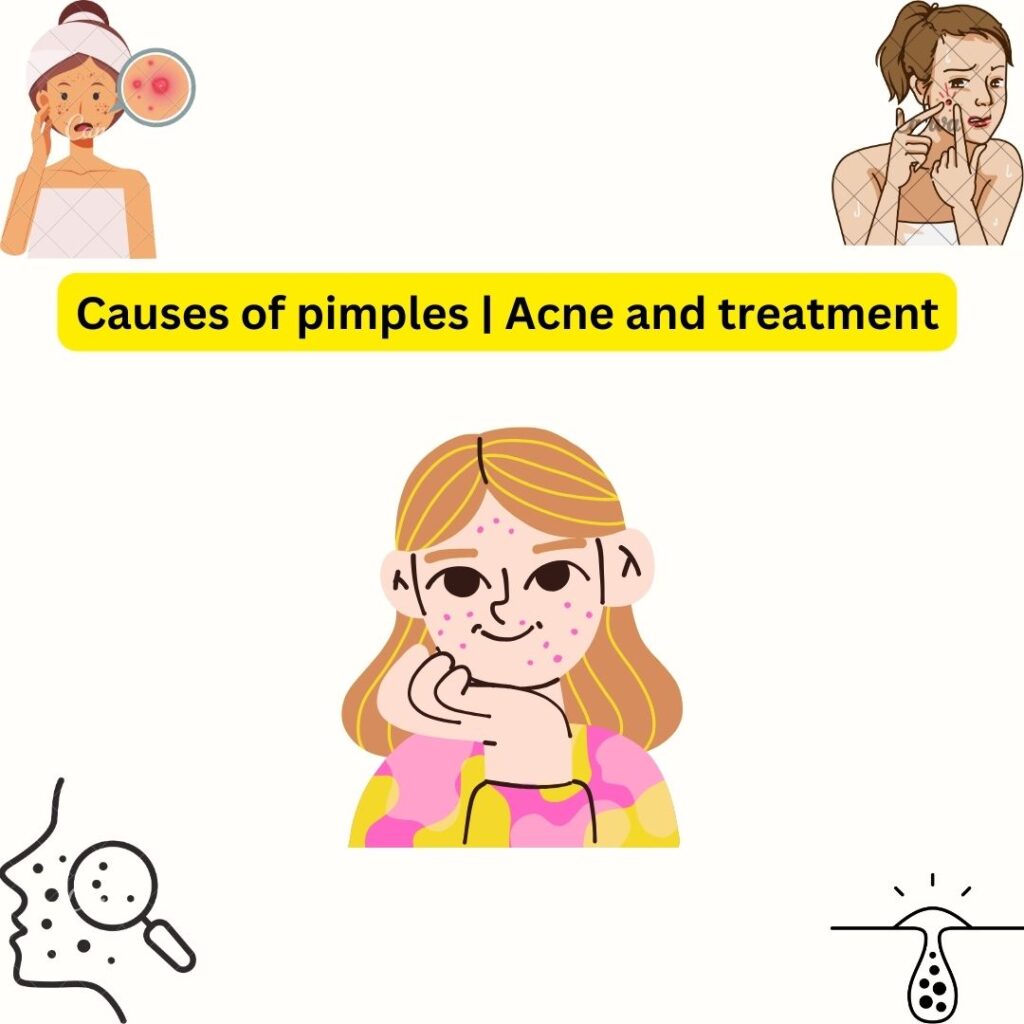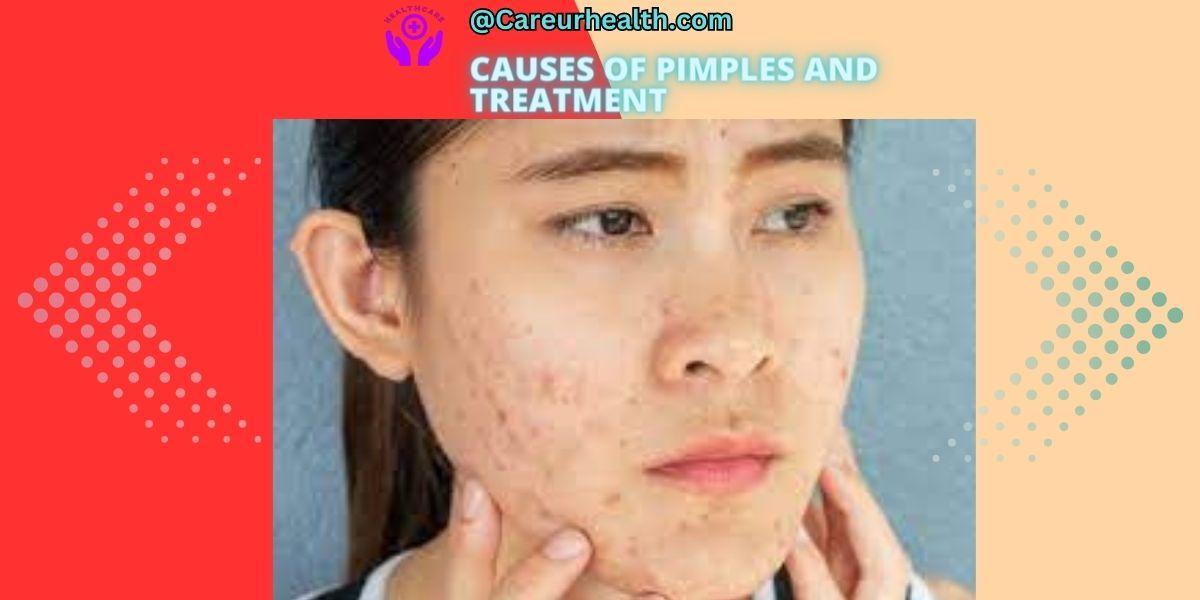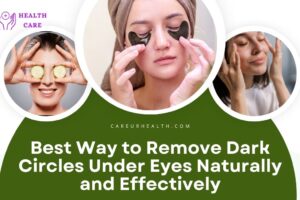Acne is a common skin condition caused by clogged or inflamed sebaceous glands or an increase in acne-causing bacteria on the skin. These are the symptoms of acne, and there are different types, such as blackheads, whiteheads, and cysts.
Treatment includes at-home remedies as well as over-the-counter and prescription pills and gels. Acne is a small blemish on the surface of the skin. May cause irritation or discoloration. Acne usually causes pimples on the face, chest, shoulders, and upper back.
The microscopic openings in your skin, known as pores, can get clogged by debris, oil, germs, and cells that have died.
You might get a pimple whenever this happens, which is also occasionally referred to as a zit or imperfection. You might have acne when you frequently acquire pimples, especially when you get multiples at once. Otherwise, the skin ailment that results in blemishes is acne.
There is a lot of acne, which causes pimples. It is an undeniable fact that acne can exacerbate emotional strain.
Acne plus acne scars overall on a person’s face and other areas of the body that are visible can have an impact on one’s confidence a d sense of self, as well as exacerbate anxiety or depressive symptoms.
Recognize that acne is a common ailment if you suffer from it.
Who does acne affect?
Acne usually affects teenagers and young adults who are experiencing hormonal changes. But it can affect babies too, and many adults suffer from acne well into their 20s, 30s, and beyond. Some people get pimples as adults. These are the causes of pimples.
How common is acne?
Causes of pimples or acne are very common. Some researchers believe that almost everyone will experience the causes of pimples acne at some point in their lives. It is most common during adolescence but can occur in adults as well.
What effect does acne have on the body? Acne is most common on the face (especially the nose, chin, forehead, and sometimes around the cheeks and lips), neck, back, chest, and upper arms.
- However, sebaceous glands are all over the body. It releases an oily lubricant called sebum that helps keep skin and hair moisturized and shiny.
- As a result, although less common, pimples may appear on the eyelids (stye), buttocks, ears, scalp, armpits (armpits), and external genitalia (penis or labia).
- Pimples don’t have a serious impact on your physical health, but they can have psychosocial effects (how society and social groups affect your mind) and psychological effects (how you feel about yourself).
- (how they perceive and act). It may be accompanied by anxiety, depression, mood disorders, and suicidal ideation.

What are the symptoms of acne?
There are many types of acne, and each type has different symptoms. These include:
- Papules: small bumps (warm and painful) that can become infected. Blackheads: These are open pores on the skin that contain excess oil and dead skin. It looks like there is dirt or darkening on the protruding part. However, irregular light reflections from clogged hair follicles cause dark spots.
- Whiteheads: These are bumps that are held closed by oil and dead skin cells. They are white or yellowish in appearance. Nodule: A round or oddly shaped mass. They can reside deep under the skin and are often painful.
- Pustule: A pus-filled pimple that looks like a white pimple and is surrounded by a discoloured ring. Picking or scratching the pustules can cause scarring.
- Cysts: These are thick yellow or white fluid-filled pimples that consist of dead white blood cells, small pieces of tissue, and bacteria (pus). Cysts can cause scarring.
What are the causes of pimples?
Anything you come into contact with can irritate your skin, which is the reason for pimples. When most people think of acne, they think of acne.
Sebaceous glands (oil glands) are located throughout the body. Clogged or inflamed sebaceous glands lead to the formation of acne. Constipation and inflammation can be caused by:
“Increased sebum production (an oily substance produced by the sebaceous glands). Abnormal formation of keratin (a protein that helps form hair, skin, and nails). It increases the presence of acne-causing bacteria on the skin”.
Is acne contagious? Acne is not contagious. You cannot infect others through skin contact.
How is acne diagnosed?
Acne is easy to spot, so it doesn’t always require a doctor’s diagnosis. However, a doctor can diagnose acne with a skin test.
You may be asked if you suffer from significant stress or have a family history of breakouts, which are risk factors.
If you are menstruating, your doctor may ask you about your menstrual cycle, as breakouts may be related to your menstrual cycle. Sudden, severe breakouts in people over the age of 50 may indicate another underlying medical condition that should be seen by a doctor.
See a dermatologist if you have severe acne (cystic acne). A dermatologist is a doctor who specializes in conditions that affect the skin, hair, and nails. And I will also tell you about the causes of pimples.
Risk of getting acne
Puberty is when you have the largest chance of getting acne. The human body goes through a lot of hormonal changes throughout this period.
- These modifications may increase the production of oil, which raises the risk of developing acne.
- When you reach maturity, hormonal acne associated with puberty typically gets better, and it may even stop occurring altogether.
- Diets or foods that include particular ingredients may affect acne: a diet low in GPIs.
- Reducing your intake of high-glycemic foods, like added sugars and processed carbohydrates, may help lessen acne blemishes.
kinds of pimples
There may be a variety of causes of pimples visible if you have pimples. The most prevalent acne lesions are blackheads as well as whiteheads, which are also known as comedones. The causes of pimples are Exposed comedones, often known as blackheads, appear at the skin’s top.
The darker look on top among these pimples is caused by oxygen in the atmosphere, not filth. Closed comedones, often known as whiteheads, appear as elevated pimples beneath the skin’s layer. They still have a flesh-coloured appearance.
Skin scarring is more likely to result from aggressive lesions, which involve: Papules. Exposed or diseased hair follicles are the cause of these little, red, elevated pimples. pustules. The tips of these little red pimples are covered in pus.
How can I get rid of acne?
Mild acne can be treated with over-the-counter medications. Some drugs include:
Azelaic acid: This is a natural acid found in various grains such as barley, wheat, and rye. It kills microbes on the skin and reduces swelling. Benzoyl Peroxide: This is available as a commercial product (Clearasil®, Stridex®, PanOxyl®, etc.).
The concentration is low, and the cleansing formula is less irritating to the skin. Irritation (dryness) is a common side effect.
Retinoids (Vitamin A Derivatives): Retinoids such as Retin-A®, Tazorac®, and Differin® help prevent clogged pores. Skin colour changes and peeling may be present. Using a retinoid every other day or with a moisturizer can help reduce these side effects or causes of pimples.
Salicylic Acid: This is available over-the-counter as a face wash or lotion for acne. It helps dissolve dead skin cells and prevent clogged hair follicles. If over-the-counter drugs don’t help your acne, your doctor may recommend prescription drugs such as antibiotics or oral hormone replacements.
Other treatments include:
Chemical peels: Chemical peels use mild chemical solutions to remove layers of skin to reduce the causes of pimples or acne. Laser Skin Resurfacing: In laser resurfacing, a short, focused, pulsating beam of light is direct at the blemish. Light rays reduce the production of sebum.
Microdermabrasion: A dermatologist or plastic surgeon uses special instruments to “abrade” the skin. Removing the top layer of skin removes blockages that cause pimples or acne. Please consult your doctor before trying these. These can irritate and make or causes pimples acne worse.
Are there home remedies to treat acne?
Various home remedies can help treat acne.
Home remedies are safe for most people, but we recommend talking to your doctor before trying any of the options below. You may be at risk of having an allergic reaction.
Some home remedies are:
- Tea Tree Oil: Tea tree oil prevents or stops the growth of bacteria. Take a small amount of tea tree oil on a cotton swab and apply it to the causes of the pimples.
- Sugar or salt scrub: A sugar and salt scrub removes dead cells from the surface of the skin. Wet your face, apply a salt or sugar scrub to your acne, and massage your skin in small circular motions for up to 30 seconds. Rinse your face with water when finished. Will help reduce the causes of pimples.
- Green tea: The moist green tea leaves help reduce oil production on the skin. Green tea is also an antioxidant. Mix dry green tea leaves with water and massage the moist green tea leaves into your skin in small circular motions for up to 30 seconds. Rinse your face with water when finished.
- Warm compresses: Warm compresses increase blood flow to the pimple, helping it heal faster. Soak a clean towel or small towel in warm water (about 35 degrees Celsius) and apply it to the pimple. Apply a warm compress to the pimple 3–4 times a day.
- Ice: Ice slows blood flow to pimples, reducing inflammation and pain. Place an ice cube or ice pack covered with a light towel over the causes pimples for at least 10 minutes. Apply ice to the pimple two to three times a day.
How long will acne last?
- Acne usually lasts 3–7 days. Most acne heals on its own, but it may take some time. Deep causes pimples (headless pimples under the skin that are hard to touch) can take weeks or longer to disappear.
- At the first signs of acne, it’s best to see your doctor and follow your doctor’s recommended treatment. and reduce the Causes of pimples.
- Moreover, you have home remedies to the causes of pimples from which you can treat it and get better results. But mind it, if pimples getting big enough, if it is doing so, then consult to your doctor.
FAQS
What are the causes of pimples?
There are various causes of pimples such as your diet pattern, pollution, irritation, puberty, hormonal changes and etc.
Can the treatment of pimples can be done at home?
Yes, if you follow proper diet and exercise you can treat your pimples at home.
What are the symptoms of pimples?
Whiteheads, pain, swelling, irritation, itching, red spot are some of the symptoms of pimples.
Read also:-
- Benefits of Kapalbhati and Anulom Vilom: Ancient Breathing Techniques for Modern Well-Being
- Breaking the Cycle: How does exercise help with depression?
- Indian Food To Increase Memory Power Doesn’t Have To Be Hard
Business Insider










